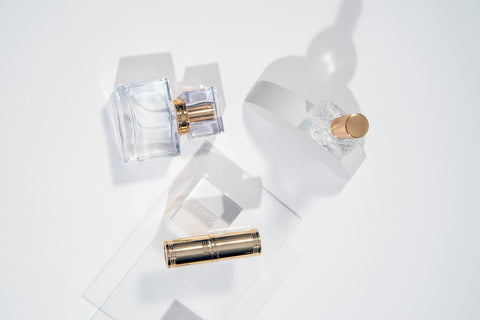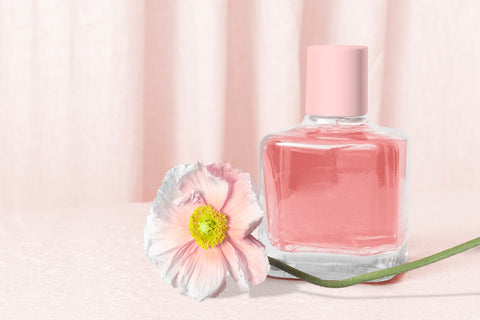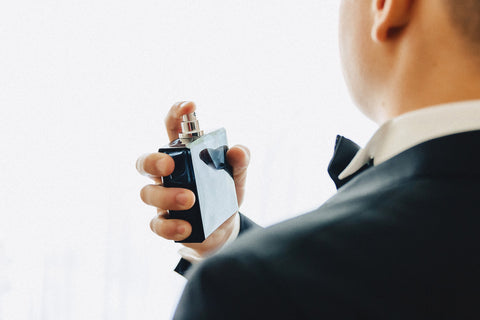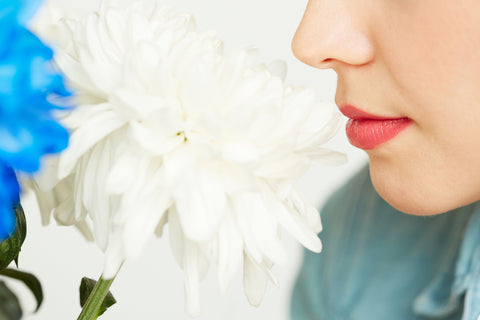Perfume, a delightful blend of scents, has long been used to enhance our presence. But can this fragrant accessory tell the world who we are? This outline explores the connection between perfume and personality, examining the psychology of scent, cultural influences, and the art of choosing a signature fragrance.

Beyond Reflection: Does Perfume Define Personality?
The Limitations of Scent-Personality Correlations
- Individuality and Personal Experiences: Our scent preferences are deeply personal. A childhood memory linked to a specific flower might make you gravitate towards floral perfumes, even if they don't necessarily align with traditional "romantic" connotations. Life experiences can also shape preferences. Someone who overcame adversity might favor invigorating citrus scents that symbolize a fresh start.
- Cultural and Social Conditioning: Cultural norms and societal expectations can influence our scent choices. In some cultures, strong perfumes are considered disrespectful, while others favor bold and noticeable scents. Gender marketing also plays a role, with certain fragrance families historically targeted towards men or women. This conditioning can lead to subconscious choices that may not truly reflect personality.
Perfume as a Tool for Self-Expression
Despite limitations, perfume offers a powerful avenue for self-expression. Here's how:
- Resonating with Your Inner Self: Scents can evoke emotions and memories. Choosing a fragrance that makes you feel happy, confident, or empowered allows you to express your inner world. Imagine a person who loves the feeling of a cozy night in. They might choose a warm, comforting perfume with notes of vanilla and amber, reflecting their desire for comfort and security.
- Creating a Personal Olfactory Identity: Our sense of smell is highly personal. By curating a fragrance wardrobe, you create a unique olfactory signature that becomes part of your overall persona. It's like a silent language, leaving a subtle yet memorable impression on others.
The Power of Scent to Transform
Perfume goes beyond simply reflecting personality; it can be a tool for transformation:
- Boosting Confidence: The right scent can act like a power suit for your nose. Wearing a perfume that makes you feel strong and sophisticated can project that confidence outwards, influencing how you interact with the world. Imagine someone who feels shy putting on a perfume with invigorating citrus notes. The scent might give them a sense of energy and boldness, helping them step outside their comfort zone.
- Projecting a Desired Image: Perfume can be used strategically to create a specific impression. If you're going for a professional vibe, a clean and crisp scent might be ideal. For a night out, a more alluring and mysterious fragrance could be your choice.
- The Psychological Impact of Scent on Self-Perception: The link between scent and self-perception is powerful. Studies have shown that wearing a preferred perfume can improve mood and even cognitive function. It's a self-fulfilling prophecy – feeling good about your scent translates into feeling good about yourself.

The Art of Crafting a Signature Scent
Crafting a signature scent is a personal journey of exploration and discovery. This section will guide you through the exciting process of finding your olfactory soulmate.
Understanding Your Own Scent Preferences
The first step is to become familiar with what truly resonates with you. Here's how:
- Become a Scent Detective: Pay attention to your emotional and physical reactions when encountering different scents. Do certain smells evoke happy memories? Do some scents make you feel energized or relaxed? Take note of these associations.
- Explore Fragrance Families: Familiarize yourself with the main fragrance families (floral, oriental, woody, citrus, gourmand, etc.). Visit perfume counters or niche fragrance stores and sample different families. Notice how they differ in mood and overall impression.
- Dive Deeper with Individual Notes: Within each fragrance family, specific notes contribute to the overall scent profile. Learn about common notes like rose (floral), sandalwood (woody), or bergamot (citrus). Fragrance counters often provide resources to identify individual notes. Experiment by smelling single notes and then fragrances containing those notes to understand their influence.
Building a Fragrance Wardrobe
Just like clothes, a curated selection of perfumes allows you to adapt to different occasions and moods. Here's how to build your olfactory wardrobe:
- Match Scent to Occasion: Consider the event or situation. A formal work presentation might call for a more understated and professional fragrance, while a night out with friends allows for a bolder and more playful scent.
- Embrace Seasonality: Scents can evoke different feelings depending on the season. In warm weather, light and refreshing citrus or aquatic fragrances might be ideal. During cooler months, richer and warmer scents like orientals or vanillas can feel more comforting.
- Time of Day Considerations: Fragrances can also be tailored to the time of day. Lighter scents often work better during the day, while heavier scents can be more suitable for nighttime wear.
The Journey of Finding Your Scent Soulmate
Finding your perfect perfume requires patience and exploration. Here are some tips for a successful search:
- Sample Wisely: Don't overwhelm your nose by smelling too many fragrances at once. At department stores, apply a small amount of a few scents on different areas of your skin. Wait for them to develop and then revisit them throughout the day to see how they evolve.
- Consider Body Chemistry: How a perfume interacts with your unique body chemistry plays a crucial role. The same scent can smell vastly different on two people. For a true picture of how a perfume will wear on you, try applying it to a pulse point and let it develop for several hours.
- Don't Rush the Decision: Finding a signature scent can take time. Don't feel pressured to buy the first perfume you like. Trust your nose and revisit fragrances that pique your interest.
- Embrace the Unexpected: Sometimes, the most unexpected scent combinations can become your favorites. Don't be afraid to experiment with layering different fragrances to create a unique and personal olfactory signature.

Cultural Influences on Fragrance
Perfume is more than just a pleasant smell; it's a window into a culture's history, traditions, and values. This section explores how cultures around the world have embraced fragrance in unique ways.
Historical Perspectives on Perfume
- Ancient Civilizations: The use of perfume dates back millennia. Egyptians used scented oils for religious ceremonies and personal adornment. In ancient China, incense played a significant role in spiritual practices and traditional medicine.
- The Rise of European Perfumery: Europe saw a surge in perfume use during the Renaissance. Floral waters and scented oils became popular among nobility, symbolizing wealth and social status. The invention of distillation techniques in the Middle East further revolutionized European perfumery, leading to the creation of more complex and long-lasting fragrances.
- Global Exchange and New Scents: The Age of Exploration brought an influx of new ingredients from around the world, influencing fragrance trends. Europeans discovered spices like vanilla and musk from Asia, which became prized ingredients in luxury perfumes.
Regional Fragrance Preferences
Climate, traditions, and cultural values all play a role in shaping regional preferences for scents:
- Warmer Climates: In hot and humid regions, lighter and refreshing scents are often favored. Citrus fruits like bergamot and lemon are popular choices, as their zesty notes offer a cooling and invigorating effect. Fragrances with aquatic notes can also be refreshing in warmer climates.
- Spicy Delights: Spices are deeply ingrained in many Eastern cultures, and their influence extends to the world of perfume. Spicy notes like clove, cardamom, and ginger are commonly found in Middle Eastern and Indian fragrances. These scents are often associated with warmth, sensuality, and exoticism.
- The Power of Incense: Burning incense has been a significant part of religious and cultural ceremonies for centuries. In Japan, the art of incense appreciation (kōdō) is a highly refined practice with symbolic meaning. Agarwood (oud) is a prized incense ingredient valued for its complex and woody aroma.
The Evolution of Fragrance
Just like fashion, fragrance trends are constantly evolving, influenced by social and cultural shifts:
- The Rise of Unisex Fragrances: Traditional gender norms in fragrance are fading. Unisex fragrances with notes that appeal to a broader audience are becoming increasingly popular. This trend reflects a more progressive and inclusive approach to scent.
- Niche Markets and Artisan Perfumes: Alongside mainstream brands, a growing niche market for artisanal and independent perfumers caters to those seeking unique and personalized scents. These perfumers often use high-quality, natural ingredients and create fragrances with greater artistic freedom.
- The Impact of Social Media: Social media has become a powerful platform for fragrance discovery and discussion. Influencers and online communities share reviews and recommendations, influencing trends and consumer preferences.
Understanding the cultural influences on fragrance allows us to appreciate the rich tapestry of scents used around the world. From ancient rituals to modern trends, perfume continues to be a powerful tool for cultural expression and personal identity.

The Allure of Scent
The human sense of smell, often underestimated, holds immense power. Perfumes, with their captivating blend of aromas, tap into this power, influencing our emotions, memories, and even how we perceive the world around us.
The Olfactory Sense and Memory
Unlike other senses, our sense of smell has a direct connection to the limbic system, the part of the brain responsible for emotions and memory. This unique link allows scents to trigger vivid memories and powerful emotions. A whiff of a specific perfume might transport you back to a childhood summer spent with grandparents, or a familiar floral scent could evoke a romantic first date.
The Emotional Connection to Scents
Certain scents have the remarkable ability to evoke specific emotions. These connections are often deeply personal, but some general associations are widely recognized:
- Floral: Floral fragrances, with notes like rose, jasmine, and lavender, are often linked to feelings of romance, femininity, and springtime freshness.
- Oriental: Warm and mysterious, oriental scents featuring ingredients like amber, vanilla, and sandalwood can evoke feelings of luxury, sensuality, and sophistication.
- Woody: Earthy and grounding, woody notes like cedarwood, sandalwood, and vetiver are often associated with strength, confidence, and a connection to nature.
- Citrus: Zesty and invigorating, citrus notes like lemon, grapefruit, and bergamot can create feelings of energy, optimism, and cleanliness.
- Gourmand: Warm and comforting, gourmand fragrances with notes of vanilla, chocolate, and coffee can evoke feelings of happiness, nostalgia, and indulgence.
It's important to remember that these are general associations. Your personal experiences and cultural background can influence how you respond to different scents.
The Art of Choosing a Perfume
Selecting a perfume goes beyond simply liking a particular smell. It's about creating an olfactory experience that complements your personality and style. Here are some factors to consider:
- Matching Fragrance to Personal Style: Do you tend to gravitate towards bold and dramatic statements, or prefer a more understated and elegant approach? Your preferred clothing style and overall persona can guide your fragrance choices.
- Choosing for the Occasion: A strong and spicy scent might be ideal for a night out, while a lighter and more refreshing fragrance might be more suitable for a work presentation. Consider the mood you want to create and the overall atmosphere of the occasion.
- Layering for a Unique Signature: For the adventurous, layering different fragrances can create a unique and personalized scent. Experiment with combining complementary notes from different perfume families to achieve a bespoke olfactory signature.
- The Influence of Trends and Marketing: While trends can offer inspiration, it's important to choose a scent that resonates with you personally. Don't be swayed by marketing hype alone. Experiment and find a fragrance that reflects your individuality.
By understanding the power of scent and the art of choosing a perfume, you can harness this alluring world to create a fragrant expression of yourself.

Unveiling the Personality in Perfume
Perfume whispers volumes about the person wearing it. By understanding the language of fragrance families and individual notes, we can begin to decipher the personality traits a scent might embody.
Fragrance Families and Their Nuances
Each fragrance family offers a distinct aromatic story, hinting at the personality traits it might evoke. Let's delve deeper into some popular families and explore their potential whispers:
- Floral: The quintessential feminine fragrance family, florals are often associated with romanticism, optimism, and a touch of tradition. Think of a blooming rose garden on a sunny day. Popular floral notes include rose (romantic, elegant), jasmine (sweet, sensual), and lavender (calming, peaceful). Someone drawn to floral scents might be seen as gentle, optimistic, and perhaps yearning for a touch of classic elegance.
- Oriental: Mysterious and alluring, orientals are known for their warm and spicy notes, often featuring ingredients like amber (rich, sensual), vanilla (sweet, comforting), and sandalwood (earthy, sophisticated). This family can evoke a sense of luxury, sophistication, and perhaps a touch of intrigue. A person drawn to orientals might be perceived as confident, independent, and possessing a certain enigmatic quality.
- Woody: Earthy and grounding, woody fragrances project a sense of confidence, stability, and a connection to nature. Think of a dense forest after a rainfall. Common woody notes include cedarwood (strong, masculine), sandalwood (creamy, warm), and vetiver (earthy, smoky). Someone drawn to woody scents might be seen as reliable, dependable, and possessing a down-to-earth personality.
- Citrus: Zesty and invigorating, citrus fragrances burst with energy, evoking feelings of freshness, optimism, and playfulness. Imagine a sun-drenched citrus grove. Popular citrus notes include lemon (bright, cheerful), grapefruit (tart, energetic), and bergamot (light, uplifting). A person drawn to citrus scents might be perceived as energetic, enthusiastic, and someone who embraces life with a positive outlook.
- Gourmand: Warm and comforting, gourmands are fragrances with notes that mimic delicious treats, such as vanilla (sweet, comforting), chocolate (decadent, indulgent), and coffee (rich, stimulating). These scents evoke feelings of happiness, nostalgia, and a sense of indulgence. Someone drawn to gourmand scents might be seen as someone who enjoys the finer things in life, appreciates comfort, and possesses a playful and perhaps carefree spirit.
Beyond the Family: Exploring Individual Notes
While fragrance families offer a general framework, individual notes within a perfume play a crucial role in shaping its overall character and the personality it might project. Here's how specific notes can influence perception:
- Top Notes: These are the first scents you smell and tend to be light and refreshing. Citrus notes like lemon or bergamot can create an initial impression of energy and optimism.
- Heart Notes: The heart of the fragrance emerges after the top notes fade. Floral notes like rose or jasmine can add a touch of romanticism and femininity. Spicy notes like clove or cardamom can hint at a sense of adventure and intrigue.
- Base Notes: The final notes to linger, base notes provide depth and richness to a fragrance. Musky notes can add a touch of sensuality and mystery, while woody notes like sandalwood or vetiver can create a sense of grounding and stability.
The interplay of these notes creates a complex olfactory tapestry. For example, a citrus fragrance with a musky base might still be refreshing but with a touch of intrigue. Understanding this interplay allows for a deeper understanding of the personality a scent might express.
Here are some additional examples of notes associated with certain personality traits:
- Spice (clove, cardamom): Adventurous, daring
- Musk: Sensual, mysterious
- Green notes (grass, leaves): Fresh, invigorating, connected to nature
- Aquatic notes (ocean breeze, water): Clean, calming, serene
The Confidence Factor: The Psychology of Scent and Self-Perception
The link between perfume and self-perception is powerful. Studies have shown that wearing a preferred scent can boost mood, confidence, and even cognitive function. When you smell good, you tend to feel good. This feeling translates into a more confident demeanor and a positive self-image. Imagine someone putting on a perfume with invigorating citrus notes and a touch of empowering musk. The scent might make them feel energized, ready to take on the day, and project a sense of confidence to those around them.
By understanding how fragrance families, individual notes, and our own psychology interact, we can begin to see perfume as a tool for self-expression and a way to unveil the unique personality stories we carry within.
Conclusion
The relationship between perfume and personality is a captivating dance, a complex interplay of scent, perception, and self-expression. While fragrance families and individual notes offer clues about the wearer, they don't paint the whole picture. Cultural influences, personal experiences, and even fleeting emotions all contribute to the unique olfactory story we tell with perfume.
The Symphony of Scent and Self
We've explored how fragrance families like the romantic florals or the enigmatic orientals can hint at personality traits. We've delved into the power of individual notes, from the invigorating zest of citrus to the grounding earthiness of wood. Yet, remember that these are just starting points. The true magic lies in the symphony these notes create, how they interact and evolve on your skin, crafting a unique and personal olfactory signature.
The Power of Perfume: Beyond Reflection, A Tool for Transformation
Perfume goes beyond simply reflecting personality; it can be a potent tool for self-expression and confidence building. Imagine a shy person drawn to a citrus fragrance with a hint of empowering musk. The scent might not only resonate with their inner desire for connection but also provide a psychological boost, allowing them to step outside their comfort zone and project a more confident and outgoing persona.
The right scent can act like a power suit for your nose, influencing how you interact with the world and how you perceive yourself. Feeling good about the way you smell translates into feeling good about yourself, fostering a positive self-image and a sense of empowerment.
An Invitation: Discover Your Olfactory Story
The world of fragrance is vast and exciting, waiting to be explored. Embrace the journey of discovering your own olfactory story. Experiment with different fragrance families, delve into the world of individual notes, and pay attention to how scents make you feel. Visit perfume counters, sample, and learn about the language of scents.
Don't be afraid to break the mold. The beauty of perfume lies in its ability to be as unique and multifaceted as you are. Perhaps you'll find yourself drawn to the classic elegance of a rose fragrance, or maybe the adventurous spirit of a spicy oriental speaks to you. There's a perfect scent waiting to be discovered, a fragrant expression waiting to tell the world your unique story.
So, embark on this olfactory adventure, and remember, the most captivating scent is the one that resonates with your truest self.

